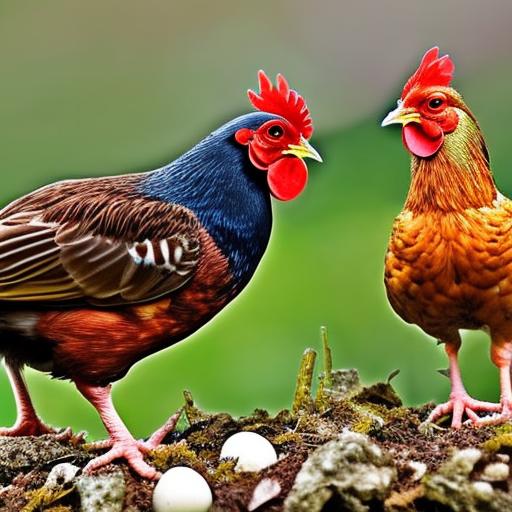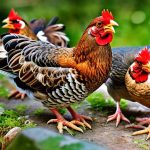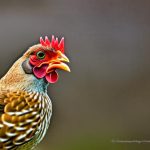Winter egg production can be a challenge for backyard chicken owners. As the temperature drops and daylight hours decrease, chickens tend to produce fewer eggs. However, with proper care and nutrition, it is possible to maintain healthy and consistent egg production during the colder months. In this article, we will discuss the factors that affect winter egg production and provide tips on how to ensure your chickens stay happy and productive throughout the winter season.
Key Takeaways
- Winter egg production requires proper nutrition, lighting, temperature regulation, ventilation, and coop maintenance.
- Providing a balanced diet with adequate protein and calcium is crucial for egg production during winter.
- Maintaining optimal lighting with at least 14 hours of light per day can stimulate egg production.
- Regulating temperature inside the coop between 40-60°F and ensuring proper ventilation can prevent respiratory issues and frostbite.
- Offering enrichment activities and monitoring egg production and flock health can improve overall well-being and productivity.
Understanding Winter Egg Production
Egg production tends to decrease during winter months due to a combination of factors. One of the main reasons is the decrease in daylight hours. Chickens require a certain amount of light each day to stimulate egg production. As the days get shorter, their internal clock signals them to slow down or stop laying eggs altogether.
Temperature also plays a role in egg production. Chickens are more comfortable in moderate temperatures, and extreme cold can cause stress and reduce their overall health and productivity. It is important to select cold-hardy chicken breeds that are better equipped to handle colder temperatures.
Providing Proper Nutrition
Proper nutrition is crucial for maintaining healthy egg production during winter months. Chickens require a balanced and nutrient-rich diet to support their overall health and egg-laying capabilities. In addition to their regular feed, offering supplemental feed and treats can help encourage egg production.
During winter, chickens may require additional calories to keep warm. Consider providing high-energy feeds such as cracked corn or black oil sunflower seeds. These feeds are not only nutritious but also help generate heat when digested.
Maintaining Optimal Lighting
Artificial lighting can be used to supplement natural daylight hours and encourage egg production during winter months. By providing additional light in the coop, you can extend the perceived daylight hours for your chickens.
The ideal lighting schedule for winter egg production is 14-16 hours of light per day. This can be achieved by using a timer to turn on the lights in the morning before sunrise and keep them on until a few hours after sunset. It is important to use safe and appropriate lighting equipment in the coop to prevent any fire hazards.
Regulating Temperature Inside the Coop
Maintaining the right temperature inside the coop is essential for the health and comfort of your chickens during winter months. The ideal temperature range for chickens is between 40-60 degrees Fahrenheit. Extreme cold can cause stress and reduce egg production, while excessive heat can also be detrimental.
Insulating the coop can help regulate temperature by keeping it warmer in winter and cooler in summer. Adding insulation to the walls, ceiling, and floor can help retain heat. Additionally, using heat lamps or radiant heaters can provide supplemental warmth during extremely cold weather.
Ensuring Proper Ventilation

Proper ventilation is crucial in the coop during winter months to maintain good air quality and prevent moisture buildup. Poor ventilation can lead to respiratory issues and other health problems for your chickens.
To ensure adequate ventilation without causing drafts or exposing chickens to cold air, it is important to have vents placed high up on the walls or roof of the coop. This allows for proper airflow without creating direct drafts on the chickens. Regularly check that vents are not blocked by snow or debris.
Keeping the Coop Clean and Dry
Maintaining a clean and dry coop is essential for the health and well-being of your chickens during winter months. Moisture buildup can lead to mold, bacteria growth, and respiratory issues.
Regularly clean and disinfect the coop to remove any droppings or debris. Use a bedding material that absorbs moisture well, such as straw or wood shavings. Replace wet bedding promptly to keep the coop dry.
Providing Adequate Roosting Space
Providing enough roosting space for your chickens is important during winter months when they spend more time inside the coop. Chickens naturally roost at night, and having enough space for them to comfortably perch is essential for their well-being.
Select appropriate roosting materials such as wooden dowels or branches that are wide enough for chickens to grip. Arrange the roosting areas in a way that allows all chickens to have enough space without overcrowding. Overcrowding can lead to stress and potential health issues.
Offering Enrichment Activities
Enrichment activities are important for chickens’ mental and physical well-being, especially during winter months when they spend more time indoors. Providing toys, treats, or allowing chickens to forage in a protected outdoor area can help keep them entertained and stimulated.
Consider hanging a cabbage or other vegetables from the ceiling of the coop for chickens to peck at. This not only provides entertainment but also offers additional nutrition. You can also scatter treats or mealworms in the bedding for chickens to search for, mimicking their natural foraging behavior.
Monitoring Egg Production and Health of the Flock
Regularly monitoring egg production and the health of your flock is crucial during winter months. Keep track of how many eggs your chickens are laying each day to identify any changes or potential issues.
Additionally, regularly check your chickens for signs of illness or injury. Look out for changes in behavior, appetite, or appearance. If you notice any abnormalities, it is important to seek veterinary care promptly to prevent further complications.
Winter egg production can be challenging, but with proper care and nutrition, it is possible to maintain healthy and consistent egg production during the colder months. Providing a balanced diet, maintaining optimal lighting, regulating temperature and ventilation in the coop, keeping it clean and dry, providing adequate roosting space, offering enrichment activities, and monitoring egg production and the health of your flock are all essential steps in ensuring successful winter egg production. By following these tips, you can keep your chickens happy and productive throughout the winter season.
If you’re interested in learning how to keep chickens laying in winter, you might also find this article on “Can Guinea Fowl Live with Chickens?” from Poultry Wizard helpful. Guinea fowl can be great companions for chickens, and this article provides insights into their compatibility and the benefits of keeping them together. Additionally, if you’re looking for tips on creating a cozy and comfortable environment for your chickens during the colder months, “The Chicken Coop Country Diner” is another informative read from Poultry Wizard. And if you’re considering expanding your flock to include guinea fowl, “When Do Guinea Fowl Lay Eggs?” offers valuable information on their breeding habits.
FAQs
What is the best way to keep chickens laying in winter?
The best way to keep chickens laying in winter is to provide them with a warm and dry shelter, adequate lighting, and a balanced diet.
How can I keep my chicken coop warm in winter?
You can keep your chicken coop warm in winter by insulating the walls and roof, using a heat lamp or heater, and providing plenty of bedding.
What kind of lighting do chickens need in winter?
Chickens need at least 14 hours of light per day to continue laying eggs in winter. You can provide this by using artificial lighting in the coop.
What should I feed my chickens in winter?
In winter, you should feed your chickens a balanced diet that includes plenty of protein, vitamins, and minerals. This can include commercial feed, as well as fresh fruits and vegetables.
How often should I collect eggs in winter?
You should collect eggs from your chickens at least once a day in winter to prevent them from freezing and cracking.
Meet Walter, the feathered-friend fanatic of Florida! Nestled in the sunshine state, Walter struts through life with his feathered companions, clucking his way to happiness. With a coop that’s fancier than a five-star hotel, he’s the Don Juan of the chicken world. When he’s not teaching his hens to do the cha-cha, you’ll find him in a heated debate with his prized rooster, Sir Clucks-a-Lot. Walter’s poultry passion is no yolk; he’s the sunny-side-up guy you never knew you needed in your flock of friends!







